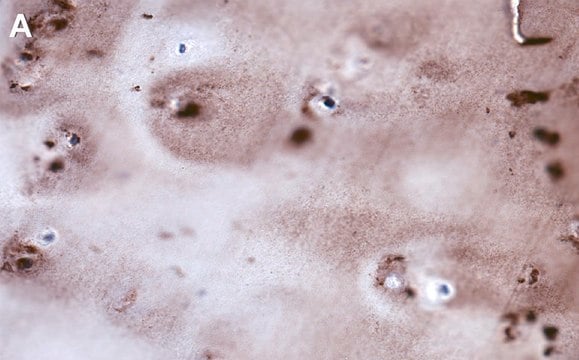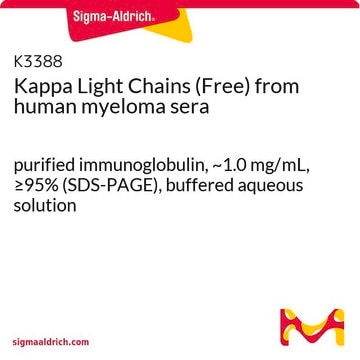推荐产品
生物源
rabbit
品質等級
共軛
unconjugated
抗體表格
purified antibody
抗體產品種類
primary antibodies
無性繁殖
Unknown, polyclonal
分子量
calculated mol wt 48.8 kDa
observed mol wt ~54 kDa
純化經由
affinity chromatography
物種活性
mouse, human
包裝
antibody small pack of 100 μL
技術
immunocytochemistry: suitable
western blot: suitable
同型
IgG
表位序列
Internal
Protein ID登錄號
UniProt登錄號
運輸包裝
ambient
目標翻譯後修改
unmodified
基因資訊
rabbit ... MYC(4609)
一般說明
Myc proto-oncogene protein (UniProt: P01106; also known as Class E basic helix-loop-helix protein 39, bHLHe39, Proto-oncogene c-Myc, Transcription factor p64) is encoded by the MYC (also known as BHLHE39) gene (Gene ID: 4609) in human. c-Myc is a transcription factor that binds DNA in a non-specific manner, yet also specifically recognizes the core sequence 5′-CAC[GA]TG-3′. It regulates the expression of multiple genes involved in apoptosis, cell differentiation, and proliferation. It is involved in the regulation of several growth promoting signaling pathways and is considered as an immediate early response gene that is downstream of many ligand-membrane receptor complexes. Its expression is tightly regulated by several transcriptional regulatory motifs within its proximal promoter region. Phosphorylation of c-Myc by serine/threonine kinase PIM2 at serine 329 is reported to lead to its stabilization. Active c-Myc is coupled to the MAX protein via its C-terminal helix-loop-helix leucine zipper (bHLHLZ) domain (aa 413-434) and this heterodimer interacts with a number of other transcription-related proteins. In normal cells its expression and function are regulated by developmental or mitogenic signals. c-Myc mRNA has a very short half-life and in the absence of positive regulatory signals there is a significant reduction in its transcription leading to low c-Myc protein levels that does not have any proliferative drive. However, in tumor cells its levels are increased either via mutations or induction via upstream oncogenic pathways. Serine 71 is shown to be phosphorylated by c-Jun kinase (JNK) that leads to induction of c-Myc induced apoptosis. Mutations leading to S71A/S81A are known to enhance transformation of cells and are shown to be more potent oncogenic mutants. It has been reported that the individual S71A and S81A mutants are not enough to promote increased transformation, but when combined they enhance transformation. Some mutations in c-Myc gene have been linked to B-cell chronic lymphocytic leukemia and Burkitt lymphoma. Over-expression of c-Myc has been reported in about 40% tumors. (Ref.: Wasylishen, AR., et al. (2013). Cancer Res. 73(21); 6504-6515; Miller, DM et al., (2012). Clin. Cancer Res. 18(20); 5546 5553; Noguchi, K., et al. (1999). J. Biol. Chem. 274(46); 32580-32587).
特異性
This rabbit polyclonal antibody detects c-Myc protein. It targets an epitope from the internal region.
免疫原
GST/His-tagged recombinant fragment corresponding to 111 amino acids from the internal region of human c-Myc.
應用
Quality Control Testing
Evaluated by Western Blotting in Jurkat cell lysate.
Western Blotting Analysis: A 1:1,000 dilution of this antibody detected c-Myc in Jurkat cell lysate.
Tested Applications
Western Blotting Analysis: A 1:1,000 dilution from a representative lot detected c-Myc in lysates from Raji cells.
Immunocytochemistry Analysis: A 1:1,000 dilution from a representative lot detected c-Myc in A431 cells.
Note: Actual optimal working dilutions must be determined by end user as specimens, and experimental conditions may vary with the end user
Evaluated by Western Blotting in Jurkat cell lysate.
Western Blotting Analysis: A 1:1,000 dilution of this antibody detected c-Myc in Jurkat cell lysate.
Tested Applications
Western Blotting Analysis: A 1:1,000 dilution from a representative lot detected c-Myc in lysates from Raji cells.
Immunocytochemistry Analysis: A 1:1,000 dilution from a representative lot detected c-Myc in A431 cells.
Note: Actual optimal working dilutions must be determined by end user as specimens, and experimental conditions may vary with the end user
Anti-c-Myc , Cat. No. 06-340-I, is a rabbit polyclonal antibody that detects c-Myc and is tested for use in Immunocytochemistry and Western Blotting.
外觀
Purified rabbit polyclonal antibody in buffer containing 0.1 M Tris-Glycine (pH 7.4), 150 mM NaCl with 0.05% sodium azide
儲存和穩定性
Recommend storage at +2°C to +8°C. For long term storage antibodies can be kept at -20°C. Avoid repeated freeze-thaws.
其他說明
Concentration: Please refer to the Certificate of Analysis for the lot-specific concentration.
免責聲明
Unless otherwise stated in our catalog or other company documentation accompanying the product(s), our products are intended for research use only and are not to be used for any other purpose, which includes but is not limited to, unauthorized commercial uses, in vitro diagnostic uses, ex vivo or in vivo therapeutic uses or any type of consumption or application to humans or animals.
未找到合适的产品?
试试我们的产品选型工具.
儲存類別代碼
12 - Non Combustible Liquids
水污染物質分類(WGK)
WGK 1
閃點(°F)
Not applicable
閃點(°C)
Not applicable
我们的科学家团队拥有各种研究领域经验,包括生命科学、材料科学、化学合成、色谱、分析及许多其他领域.
联系技术服务部门








